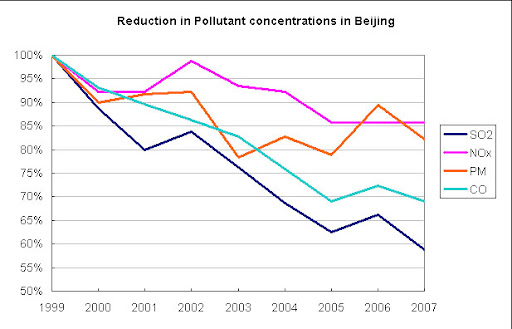Over the next few weeks, as Beijing's air quality is scrutinized on a day-to-day basis, I hope that the big picture isn't always forgotten. By that I mean, contrary to popular assumption, the air quality in Beijing is improving. The following two graphs show, respectively, progressively increasing annual numbers of Blue Sky Days in Beijing and progressively decreasing average concentrations of major pollutants here over the last 10 years or so.
Data Source: Beijing EPB Environmental Annual Reports (in Chinese)
--
Update 10/14/08: A report published in late September, 2008, raises valid questions about the integrity of the data used to count annual number of Blue Sky Days. More commentary in this post.
--
During the Games, I anticipate many Western media articles lambasting Beijing's air quality. Unfortunately, I do not anticipate any such articles acknowledging the progress that Beijing has made, and I find that to be very unfortunate. Creating change in attitude and behavior in China - or anywhere, for that matter - requires tempering your criticism with positive encouragement.
It's sort of like encouraging a friend to quit smoking. If your friend cuts down from two packs a day to one pack a day, the most effective strategy would be to say, "hey, great job, keep up the good work, soon you'll be down to half a pack a day." On the other hand, if you continue berating your friend with comments like, "I can't believe you smoke, that is disgusting! We can't be friends any more until you quit altogether," then your friend will presumably either start ignoring your "advice" or just start lying to you.
On a related note, I am well aware that there are those who question the accuracy of China's reported air quality data, and those who disagree with the use of the Blue Sky Day metric altogether. (I plan to write a post on this topic sometime over the next few days.) However, while I admit there is a definite need for independent confirmation of officially reported Chinese statistics, the "China's data is unreliable" trump card must be played very cautiously, as it can be interpreted as unconstructive criticism and can often be counter-productive.
In May / June of this year, API data was not reported at all by MEP for a few weeks. At that time, my concern was that, facing strong international criticism of air quality, China's strategy was simply to silence the science of the debate by withholding the data. I was very relieved to see the data go back online in mid-June, and was reminded that any data is better than no data.
Wednesday, July 30, 2008
Subscribe to:
Post Comments (Atom)






1 comment:
i absolutely agree that the authorities are making great progress on certain pollutants, but unfortunately there is no progress on PM10 and it remains at a very high level, and it is sad that the authorities refuse to recognise this ('the haze'); it should not be a matter of face. and indeed there were already serious questions about the official data (values around 100, stations replaced) and now again something seems to be going on; that does not help anybody i believe.
Post a Comment
Note: Only a member of this blog may post a comment.